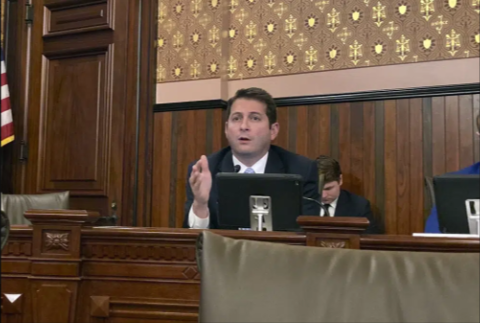Democrats who control the Illinois General Assembly approved followup clarifications of their watershed criminal justice overhaul Thursday, trying to appease critics by adding some offenses to a list of crimes that qualify a defendant to remain jailed while awaiting trial.
Senate action followed by the House came on the final day of the Legislature’s fall session and exactly one month before the Jan. 1 effective date of the so-called SAFE-T Act. The act notably eliminates the posting of a cash bond — a practice long used to ensure the accused appears at trial, but which critics says penalizes the poor.
The goal of the proposal, which only awaits the expected signature of Democratic Gov. J.B. Pritzker, is to detain dangerous people while they await trial, while not locking up those who pose no threat but sit in jail simply because they can’t afford bail, according to proponents.
Democrats easily put up the 3/5th majority vote required by the Constitution to make the plan effective immediately while Republicans could only mock them for having to return repeatedly to make corrections or clarifications.
The SAFE-T Act spells out rules for police use of force in immobilizing troublesome suspects, requires body cameras on all police by 2025 and more.
Much of Thursday’s focus was on sweeping cash bail out the door, following a handful of states that prohibit or restrict it, including California, New Jersey, Nebraska, Indiana and New York.
But Republicans remain worried about the risks of potentially releasing dangerous criminals. They also expressed concern about the short timeline for judges and prosecutors to prepare for the changes, and what they see as as the flight into retirement of law enforcement officers over objectionable parts of the act.
Sen. Steve McClure, a Springfield Republican and former prosecutor, acknowledged the expansion of the detention net to include forcible felonies and those not eligible for probation, along with those accused of hate crimes and other serious offenses.
Republicans pounced on the repeated changes to the law despite Democrats’ claims that it was solid. Peters’ legislation marks the third so-called “trailer bill” designed to clean up misunderstandings in the past two years.
In the House, Rep. Deanne Mazzochi, a Republican from the Chicago suburb of Elmhurst, took a shot at Chicago Democratic Rep. Justin Slaughter, who during debate in April on the plan he sponsored, complained of “the stench of racism coming from that side of the aisle,” identifying Republicans.
“We did object to taking bad utopian legislation that historically has never worked and saying that somehow our practical, common sense objections to legislative language that we knew was going to create problems ... were based on racism was offensive,” Mazzochi said.
Another change sets up a timeline after New Year’s so that those incarcerated this month may request hearings to be eligible for the new process and perhaps be released.
State Sen. Jason Barickman, R-Bloomington, asks questions during a committee hearing on Thursday, Dec. 1, 2022, in Springfield, Ill., about legislation to clarify the SAFE-T Act, a sweeping criminal justice overhaul that notably eliminates cash bail. Republicans worry that the law, which takes effect Jan. 1, 2023, would allow dangerous criminals out on the street when they should be detained awaiting trial. (AP Photo/John O'Connor)
Advertisement
Illinois Democrats touch up no-bail law for Jan. 1 debut
Advertisement
Latest State & National
State & National
8 hours ago
State & National
yesterday
State & National
yesterday
State & National
Dec. 21, 2025
State & National
Dec. 20, 2025
ADVERTISEMENT
Most Read >
ADVERTISEMENT
Latest State & National
State & National
8 hours ago
State & National
yesterday
State & National
yesterday
State & National
Dec. 21, 2025
State & National
Dec. 20, 2025
Advertisement
ADVERTISEMENT





